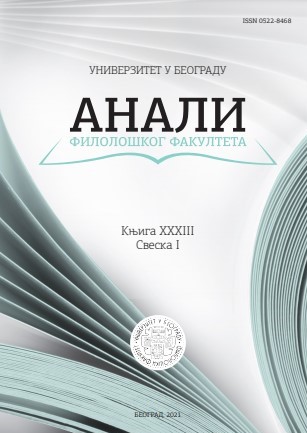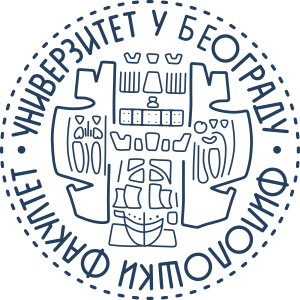Узроци перзистенције опсолетних генитива у немачкој фразеологији
DOI:
https://doi.org/10.18485/analiff.2021.33.1.6Keywords:
фразеологизам, фразеолошка стабилност, фосилизована синтаксичка обележја, опсолетни типови генитива, адвербални genetivus possessivus, genetivus superlativus, субјекат у генитивуAbstract
Структурна стабилност фразеологизма једно је од оних дистинктивних обележја овог језичког знака којем је немачка фразеологија у досадашњим истраживањима поклањала изузетно велику пажњу. Она се дефинише као устаљеност компонентског састава, што подразумвева најчешће веома ограничене могућности експанзије, редукције или замене компонената, а истовремено и врло ограничене могућности различитих синтаксичких трансформација. Системска стабилност се у немачкој фразеологији по правилу одређује и као једни узрок за постојање различитих фосилизованих обележја у формалној структури одређеног броја фразеологизама у савременом немачком језику, која воде порекло из минулих епоха (пре)историје немачког језика, при чему се остали могући узроци занемарују.
У раду се полази од претпоставке да системска стабилност представља искључиво само један од фактора перзистенције фосилизоване синтаксе фразеологизама те да је она резултат и осталих могућих фактора. На примерима три типа опсолетних генитива, адвербалног genetivus-a possessivus-a, субјекта у генитиву и адноминалног genetivus-a superlativus-a утврђују се и остали узроци перзистенције опсолетних генитива: немоделираност фразеолошке супкласе, утицај синтаксе класичних језика, могућност секундарне фразеологизације и порекло фразеологизмa.
Downloads
Published
How to Cite
Issue
Section
License

This work is licensed under a Creative Commons Attribution-ShareAlike 4.0 International License.
Authors who publish with this journal agree to the following terms:
- Authors are confirming that they are the authors of the submitting article, which will be published (print and online) in the journal Anali filološkog fakulteta by the Faculty of Philology, University of Belgrade (Faculty of Philology, Studentski trg 3, 11000 Belgrade, Serbia). Author’s name will be evident in the printed article in the journal. All decisions regarding layout and distribution of the work are in hands of the publisher.
- Authors guarantee that the work is their own original creation and does not infringe any statutory or common-law copyright or any proprietary right of any third party. In case of claims by third parties, authors commit their self to defend the interests of the publisher, and shall cover any potential costs.
- Authors retain copyright and grant the journal right of first publication with the work simultaneously licensed under a Creative Commons Attribution-ShareAlike 4.0 International License that allows others to share the work with an acknowledgement of the work's authorship and initial publication in this journal.
- Authors are able to enter into separate, additional contractual arrangements for the non-exclusive distribution of the journal's published version of the work (e.g., post it to an institutional repository or publish it in a book), with an acknowledgement of its initial publication in this journal.
- Authors are permitted and encouraged to post their work online (e.g., in institutional repositories or on their website) prior to and during the submission process, as it can lead to productive exchanges, as well as earlier and greater citation of published work.





